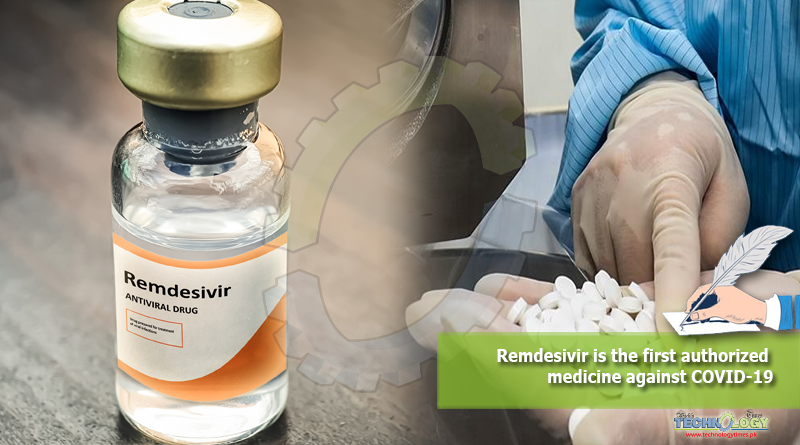Coronaviruses are a family of viruses.Remdesivir is the first authorized medicine against COVID-19. The world is currently grappling with the family member called Severe Acute Respiratory Syndrome Coronavirus 2 or SARS-CoV-2.

The name of its disease is coronavirus disease or COVID-19, because it was first reported in the year 2019. Since then, COVID-19 has spread throughout the world like a wildfire. Many research groups are furiously struggling to discover a treatment against the virus. The first workable breakthrough came recently when Gilead Sciences Inc., USA, announced that their drug Remdesivir, originally developed against Ebola virus disease, shortened the recovery time of hospitalized COVID-19 patients. The results were impressive enough for the US Food and Drug Administration (FDA) to authorize the emergency use of Remdesivir against COVID-19 on May 1, 2020. Here I will talk about how an Ebola drug became the first authorized therapy against SARS-CoV-2.
Mechanism of action
Both Ebola and coronaviruses have RNA as their genetic material. Both use host cell’s resources to replicate and make more copies of themselves. Remdesivir plays a trick: it presents itself as a natural building block for RNA synthesis. Viruses need that building block to make their RNA genomes. Consequently, Remdesivir gets incorporated into the viral RNA, making the virus incapable of replicating further.
Is Remdesivir safe? Yes, probably.
The use of Remdesivir in the West African Ebola virus epidemic (2014–2016) and Kivu Ebola epidemic that started in August 2018, tried to establish its safety in humans. Remdesivir was also found to be relatively safe in humans afflicted with another coronavirus called MERS-CoV. The recent phase 3 trial on serious COVID-19 patients employed intravenous dose of 200 mg on day 1 followed by 100 mg on days 2–10 in single daily infusions. The side effects included elevated liver enzymes indicating liver damage, nausea, vomiting, shivering etc., but overall, Remdesivir was safe to consume in that patient group.
Is Remdesivir effective? Yes, sort of.
Remdesivir shortened the recovery time by 4-5 days for serious COVID-19 patients, indicating its effectiveness in hospitalized cases. FDA approval is for emergency situations, which means that further clinical trials are warranted to establish its safety and effectiveness against SARS-CoV-2.
Remdesivir is definitely a ray of hope in the fight against coronavirus, but the world is yet to see a therapy applicable to the vast majority of COVID-19 patients.
References
Arabi YM, et al. (2020). Treatment of Middle East respiratory syndrome with a combination of lopinavir/ritonavir and interferon-β1b (MIRACLE trial): statistical analysis plan for a recursive two-stage group sequential randomized controlled trial. Trials, 21. https://doi.org/10.1186/s13063-019-3846-x.
Centers for Disease Control and Prevention. (2019). 2014-2016 Ebola outbreak in West Africa. Available at https://www.cdc.gov/vhf/ebola/history/2014-2016-outbreak/index.html.
Gilead Sciences, Inc. (2020). Gilead announces results from phase 3 trial of investigational antiviral remdesivir in patients with severe COVID-19. Press Releases available at https://www.gilead.com/news-and-press/press-room/press-releases/2020/4/gilead-announces-results-from-phase-3-trial-of-investigational-antiviral-remdesivir-in-patients-with-severe-covid-19.
Gordon JC, et al. (2020). The antiviral compound remdesivir potently inhibits RNA-dependent RNA polymerase from Middle East respiratory syndrome coronavirus. Journal of Biological Chemistry, 295. https://doi.org/10.1074/jbc.AC120.013056.
Kourtis AP, et al. (2015). Ebola virus disease – focus on children. Pediatric Infectious Disease Journal, 34(8). https://doi.org/10.1097/INF.0000000000000707.
Medecins Sans Frontieres. (2019). DRC Ebola outbreaks, crisis update – April 2020. Available at https://www.msf.org/drc-ebola-outbreak-crisis-update.
Wang Y, et al. (2020). Remdesivir in adults with severe COVID-19: a randomised, double-blind, placebo-controlled, multicentre trial. Lancet. https://doi.org/10.1016/S0140-6736(20)31022-9.
Author : Jamshed Arslan, Pharm D, PhD Assistant Professor Department of Basic Medical Sciences, Faculty of Pharmacy, Barrett Hodgson University, Karachi, Pakistan
